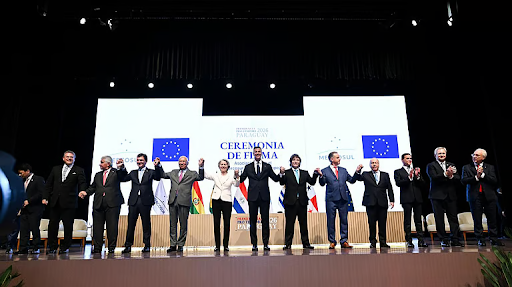



Signed in 1215, the Magna Carta curbed King John’s arbitrary rule, establishing that the king is subject to law. Though annulled, its clauses inspired modern democratic principles, influencing constitutions worldwide. Only four original copies survive, with clauses 39 and 40 underpinning habeas corpus and the rule of law.

Copyright infringement not intended
Picture Courtesy: INDIAN EXPRESS
The Magna Carta signed over eight centuries ago on 15th June 1215, is a foundational document in the history of democracy and human rights.
The Magna Carta was born from a political crisis fueled by the actions of an unpopular king.
King John's Failures => King John of England was facing immense pressure. He had suffered significant military defeats, losing valuable territories in France, such as Normandy, by 1204.
Oppressive Taxation => To fund his expensive and largely unsuccessful wars to reclaim these lands, King John imposed heavy taxes on his aristocrat. This created widespread bitterness among the powerful nobles who were expected to finance his campaigns.
Aristocrats Rebellion => John's defeat at the Battle of Bouvines in 1214. The English aristocrat, tired of his arbitrary rule and financial demands, revolted. They captured London and forced King John to meet them at Runnymede, near the River Thames.
Limiting Royal Power => The aristocrat's goal was to curb the king's absolute power and protect their privileges. They presented him with a list of demands, which became the basis for the Magna Carta.
The Rule of Law => The most crucial principle in the Magna Carta is that the king and his government are subject to the law of the land. The monarch could no longer rule by personal whim.
Clause 39 => It states: "No free man shall be seized or imprisoned, or stripped of his rights or possessions... except by the lawful judgment of his equals or by the law of the land." This clause is the historical root of the right to a fair trial by jury and the principle of habeas corpus, which protects against unlawful detention.
Clause 40 => This clause promises justice for all, stating: "To no one will we sell, to no one deny or delay right or justice." It establishes the principle of equal access to justice for all citizens.
An Elite Document => It was a pact between the king and his wealthy aristocrats. It was not intended to be a declaration of rights for all people.
"Free Men" Only => The rights mentioned in the charter were granted only to "free men," a group that constituted less than half the population. The vast majority, including serfs (unfree peasants tied to the land), were excluded.
Limited Rights for Women => The document offered very few protections for women, except for certain rights granted to widows.
Quick Annulment => King John had no intention of honoring the agreement. Within ten weeks of signing it, he had Pope Innocent III declare the charter null and void, plunging England into civil war.
A Symbol of Liberty => Over centuries, the Magna Carta evolved from a specific peace treaty into a universal symbol of liberty and resistance against arbitrary rule.
Inspiration for the United States => The Magna Carta influenced America's founding fathers. During the American Revolution, colonists argued they were entitled to the rights guaranteed in the charter. Its principles are echoed in the U.S. Constitution and the Bill of Rights, particularly in the amendments concerning due process and trial by jury.
A Global Blueprint for Democracy => It has served as an inspiration for countless movements for freedom and constitutional governance, forming the basis for human rights declarations and constitutions around the world.
Source:
|
PRACTICE QUESTION Q. What is the most fundamental principle established by the Magna Carta? A) The establishment of a democratic parliament B) The separation of church and state C) The idea that everyone was subject to the law D) The right of all men to vote Answer: C Explanation: The idea that everyone, including the king, was subject to the law is the foundation of the Magna Carta's legacy. Before the Magna Carta, the belief was that the monarch ruled by divine right and was therefore above the law. The Magna Carta challenged this idea by arguing that even the king had to abide by the laws of the land. This principle is foundational to the development of constitutionalism and the rule of law in many countries around the world. |



© 2026 iasgyan. All right reserved